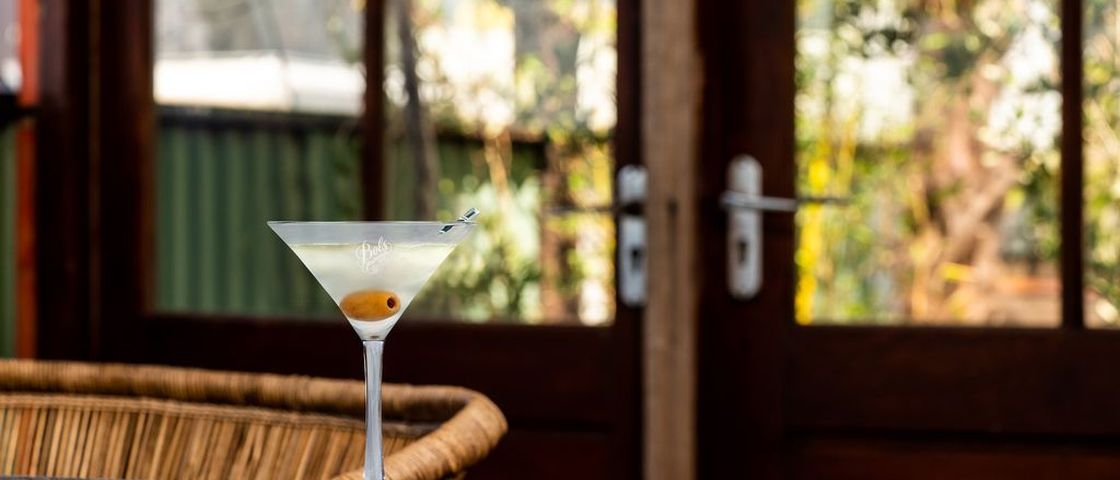Get down and dirty with a Dirty Martini cocktail
Well-known variation to a classic Martini cocktail
Only 3 ingredients (Damrak Gin, Dry Vermouth, Olive brine) needed
Invented by cocktail lover and president Franklin Delano Roosevelt
"The Dirty Martini is probably one of the worst drinks when made incorrectly, but when properly prepared it can be a sterling potion," cocktail expert Gary Regan once wrote. And that's exactly why we feel the Dirty Martini is such an interesting variation of the classic Martini cocktail. It's not just adding some gin to your dry vermouth. It's finding the right balance between those two and the quality of the olives and olive brine that make the Dirty Martini delicious. What is the right balance in this recipe you ask? Hold on tight and let's get Dirty!
How to make a Dirty Martini?
Although a Dirty Martini only contains three ingredients, it's a boozy and pungent cocktail. The gin provides a strong herbal base, complemented by the floral sweetness of the vermouth. The olives provide a savoury note that beautifully pairs with both gin and vermouth.
Dirty Martini ingredients
60 ml Damrak Gin
10 ml Dry Vermouth
5 ml olive brine (from a can or jar)
Dirty Martini glassware and tools
Martini glass
Mixing glass
Jigger
Strainer
Bar spoon
Pour all the ingredients into a mixing glass and fill it two-thirds of the way up with ice.
Stir the cocktail well for around 20 seconds and strain it into a chilled martini glass.
Garnish the cocktail with an olive on a cocktail stick.
What makes the Martini Dirty?
Usually, the Martini is a clear cocktail, only using gin and dry vermouth. When adding a splash of olive brine, the cocktails get cloudy and looks a little 'dirty'. An important tip to NOT make your Martini taste dirty is to use good quality fresh olives and to make sure all ingredients are well balanced.
A Dirty Martini with love from Amsterdam
As we like to give our cocktail recipes an Amsterdam twist, we use our very own Damrak Gin. With a more pronounced citrus flavour than any other gin, Damrak Gin gives your Dirty Martini a little fresh spark.
History of the Dirty Martini
The Dirty Martini is one of the most popular gin variations on the iconic Martini cocktail. And that's mostly because the inventor of the Dirty Martini is often thought to be President Franklin Delano Roosevelt, the 32nd president of the USA. Although there's no concrete evidence to suggest he invented the Dirty Martini recipe we do know he loved his cocktails.
The 3 best variations of the (Dirty) Martini recipe
The Dirty Martini is already a variation on a classic cocktail: the (Dry) Martini. How to make a variation on a variation?
Recipe variation 1 – Go back to the original
The classic cocktail consists of gin and dry vermouth, stirred with ice, strained and served straight up in a chilled Martini glass. Switch the gin for Bols Genever and you'll get a nice malty Martini. You can also serve it as a Dry Martini or stir it with olive brine for a Dirty Genever Martini.
Recipe variation 2 – Experiment with types for vermouth
The Dirty Martini is a member of the Martini cocktail family, which in turn is a member of the vermouth cocktail category. Dry, white vermouth can be replaced with an Extra Dry Vermouth, a Rosé Vermouth or another white aperitif wine such as Lillet Blanc or Cocchi Americano. These aperitif wines are characterized by their herbal, gentian flavour (instead of wormwood) and sweet undertone. Adjust the ratio to taste and create the perfect balance.
Recipe variation 3 - Replace the olives and olive brine with another unexpected flavour
One of our favourite variations on the Martini is the Gibson. The gin and vermouth are used in exactly the same proportions; you just garnish it with a pickled onion. This gives the cocktail an interesting but delicious flavour. The original Gibson doesn't contain olive brine, but as an alternative, you could always add a bar spoon of vinegar from a jar of pickled onions.
/f/111659/1024x683/5e7d3b1e65/dirty-martini-cocktail.jpg)
